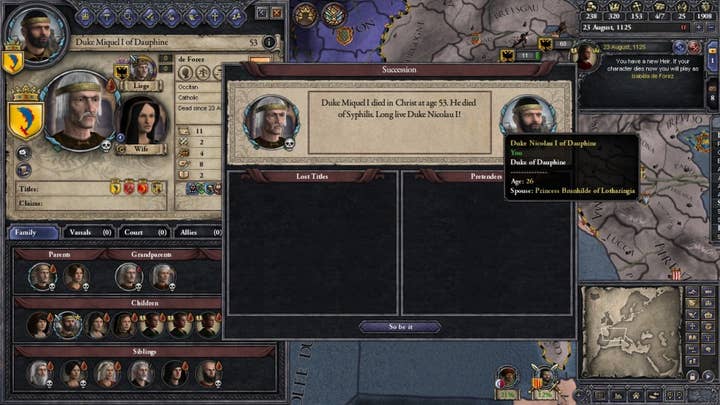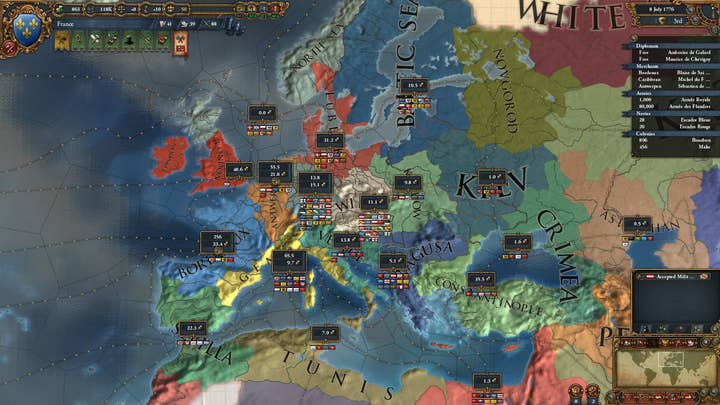"2015 is going to be our year"
Paradox's Fredrik Wester talks doubling revenues, Steam sales and that Sony deal
It's another bright, warm morning in LA. I'm sitting by a clear, shimmering pool in the comfortable old-world surroundings of the Figueroa hotel, feeling a million miles away from the intensity and hustle of the E3 show floor. Sat opposite me is a relaxed and happy Fredrik Wester, CEO of Paradox. We're laughing as we exchange stories about poisoning babies, assassinating barren wives and forcing uncooperative princes into miserable marriages where they catch syphilis and die of madness and decay.
A week in Hollywood might change a man, but we're neither of us gleeful psychopaths. The war stories we're swapping are the bread and butter of Crusader Kings II, a complex, brutal mediaeval grand strategy game which is perhaps the most quintessentially Paradox of all the studio's games. I've never been able to achieve much more in it than accelerating the inbreeding rates of Western Europe at an alarming rate, but I've had a lot of fun arranging knives in the dark for scurrilous barons, disenfranchising the minor royalty of Scotland and exiling my own children to the care of scabrous and demented Transylvanian princes. It comes as no surprise at all when I discover that Paradox's fervent and dedicated fanbase has already rolled out an extremely apt Game of Thrones mod.
"Our vision is to provide what we call a gamer lifestyle. That might sound a bit bombastic, but the people who play our games see games as a hugely important part of what they do."
The point being, Wester tells me, Paradox's fans are dedicated, loyal and entrenched very deeply in the things they love, even when they're niche, complex and require an understanding of several methods of monarchistic succession.
Two years ago, at GamesIndustry International's GameHorizon event, Wester gave a memorable presentation in defence of the squeezed middle: an argument that niche markets can be some of the most faithful, rewarding and profitable if you know how to tickle them exactly where they like it. Paradox's games are largely of the grand strategy variety, vast and sprawling with an affectionate reputation for a steep learning curve and the occasional launch bug. In truth, as big a fan as I am, Paradox doesn't seem like the most obvious choice for the console-exclusive publishing partnership which Sony announced on-stage during its press conference earlier this week.

"They actually reached out about 18 months, two years ago, and started talking about their new console," Wester tells me when I ask how it all came about. "I was brutally honest! I said, 'you know what, it's really hard working with you guys. We've had a terrible experience trying to get stuff out on PS3.' They asked us to give them a chance. They were changing a lot internally, removing some administrative barriers, obstacles to publishing on the platform. So they came to the office and made their presentation. We loved it.
"Their offering is very hardcore gaming centric. They want to be a full gaming experience, not just the AAA titles, but indie stuff and self-published games too. You could probably say that they're most influenced by Steam. Steam has 3,500 games in its catalogue and that's very hard for a console to compete with. Even if that console is cheap to buy, there isn't that wide variety of games at launch. Even buying a really expensive gaming PC is a good investment if you have Steam."
PC is very much Paradox's home turf. Magicka, the series which announced the Paradox deal during Sony's presser is the company's biggest seller, touching on three million units. It's also by far the most suitable game in the publisher's stable for console play, so I'm pleasantly surprised to hear that Wester's company has more in the works.
"If somebody else wants to release say, Magicka 2 on their console as well though, maybe Xbox One, we'd be happy to do that, if Microsoft were interested."
"We have a handful of games that we're making for PS4. Most, we're first and foremost making for PC, because that's still our original platform, so we're more adopting them to the PS4, but some of those concepts were developed with the idea of a gamepad as the primary input device, so I guess you could say they were developed primarily as console games.
"At the moment we have an exclusive with Sony for all the games we're making, so they'll all be PC and PS4, although PC includes Linux and Mac, too. So that's the plan." Wester spreads his palms casually with a grin. "If somebody else wants to release say, Magicka 2 on their console as well though, maybe Xbox One, we'd be happy to do that, if Microsoft were interested."
We discuss the nature of the two conferences for a while and I posit that Microsoft leaned more towards the mass-appeal AAA crowd pleasers, whilst Sony had more of the unusual, the experimental, about it's presser. Of course, there was a little of each in both, but Shawn Layden's quote on Vib Ribbon seemed to encapsulate the Sony ethos.
"Vib Ribbon really embodies the PlayStation spirit. It might not have been a million seller, but that's not the point."
Shawn Layden at Sony's E3 press conference.
Ambitiousness aside, Wester knows that the sort of games Paradox is making are unlikely to ever have the huge mass-appeal that Microsoft was keen to promote. Was Layden's philosophy on Vib Ribbon, making games that a few people love rather than a lot of people like, key to the decision to go with them for the deal?
"We want to make those favourite games of all time, the games you talk about, the games that are your little secret. When you sit in company and talk about games to non-gamers, they almost always ask what your favourite game is. Generally you end up saying: 'oh, it's a game you probably won't have heard of, but it's awesome.' Those are the type of games I want us to make.
"When I tell people I work in the games industry and they ask how big the company is and I tell them 150 people, with another 200 on contract, they're usually quite impressed. 'That's sizeable, what famous games do you make?' I have to say, 'no famous games at all, those aren't the kind of games we make!' If we're going to make a game that's a household name, then you need 5,000 people." He chuckles. "Unless you're Mojang."
Magicka has always been about chaos, Wester tells me. It's very much tongue in cheek, as the Vietnam expansion made abundantly clear, and Wester is hoping that its local multiplayer-focused gameplay can bring back a bit of the couch-based, dead-leg distributing local co-op enjoyment that the modern focus on online multiplayer has made very rare.
"Modern co-op often means you're playing together, but it's not a social experience. Magicka is made for a couple of friends with beers to come together and laugh. And kill each other. That's the kind of experience couch co-op brings and that's a big gap we can fill with PlayStation. We're trying to make it even more chaotic. You can run whilst casting spells, like in Wizard Wars - we're improving on all the fun from the first game. It's made to be co-op. You can play it single player but it really shines in co-op."
The announcement in Sony's conference might have been about Magicka 2, but there's also the ongoing deal. I see if Wester will be drawn on what else the company has in store for the platform, but he's understandably cagey.
"We're looking at Runemaster, what we can do with that. Nothing's finalised yet, but we're looking at it. It works with a gamepad, too, so we should be able to do it. The engine isn't optimised for the PS4, but it's an idea. We actually have another co-op game that I can't talk about yet - that's being announced later this year - which is being made by a really respected developer with a great track record. That should have online and couch co-op too. It's a new IP that's basically made for the console experience."

Paradox isn't a huge publisher, but it is growing fast. With the launches of both Xbox One and the PS4 exceeding all but the most optimistic expectations, is the Sony deal a sign that Wester is looking to move out of his PC home territory?
"We're becoming more of a two-front company at least in that aspect, in terms of console and PC," he allows. "But I actually want to dip our toes more into mobile. The grand strategy games will fit really well there. I think there's a huge demand for hardcore games on touchscreen devices. Every time I fly over the Atlantic I look for a game to play. There are plenty of great match-three games, but I can only play them for five minutes, not five hours straight. That's the type of game we want to bring to mobile, not the games you play on your commute, but five or seven hour experiences. But we're never stepping away from those hardcore PC games. Gamer's games.
"Our vision is to provide what we call a gamer lifestyle. That might sound a bit bombastic, but the people who play our games, they see games as a hugely important part of what they do. It's a big and defining hobby. Some people go sky-diving or watch ten games of football a week. Our gamers play our games. When we checked the stats for Europa Universalis, after three months, the average time spent playing was 150 hours. A full work month in three months. That's crazy!
"2014 is going to be a good year, but 2015 is when we're really going to really take off as a publisher. Maybe even double our revenue from 2014"
"We were guessing before we checked. I said 60 hours, thinking that would be a huge stretch. Some people said 75, our CFO said 35. 150 hours, that's a lot. Those are the type of games that we want to make."
Sticking to his roots is a laudable goal, and nothing less than I'd expect from a man who understands his customer base so well, but the Sony deal still represents a huge opportunity to reach new fans. The few minutes of limelight on the Sony stage alone is something that most publishers of Paradox's size would be transformed by. I ask Wester if he's happy with his company's prospects.
"2015 is going to be our year," he says with complete confidence. "2014 is going to be a good year, but 2015 is when we're really going to really take off as a publisher. Maybe even double our revenue from 2014. We have the potential to do that, we just need to pull everything together in the same direction.
"We're carving out new niches, things we think are overlooked and don't get the attention they deserve. We continue to be a bit crazy, a bit out there with our concepts. We know that about three out of every five are going to fail miserably, but it's important to try. If you don't try then you never find the Magickas.
""We're carving out new niches. We continue to be a bit crazy, a bit out there with our concepts. We know that about three out of every five are going to fail miserably, but it's important to try"
"The growth will be a mixture of both PC and PS4, plus our grand strategy games just keep getting better. I look at Hearts of Iron IV and I think 'God damn, that's a good game!' I already think that. I'm proud to say that - we look at the game and we feel happy. It looks good, it plays well, we can already stream it to the gamer. In 2005/6, if the game was playable two months before release, we were really happy. Our games were buggy, no shit. Now, we have a chance to test the games properly and make sure they're really good at release."
Presumably, I ask, Sony is probably quite keen on Paradox's games arriving on PSN with considerably less...idiosyncrasies than the company's PC fans are used to accepting?
"Ahhh, yeah," says Wester, with plenty of good humour. "We're getting better. Europa Universalis IV was our highest Metacritic ever, at 87 per cent, partly because of that. We're getting better."









